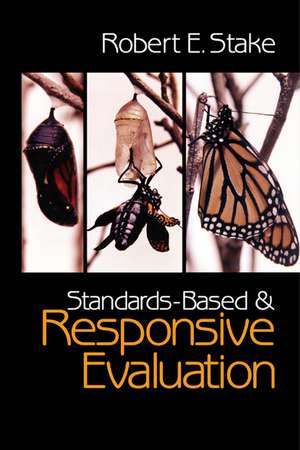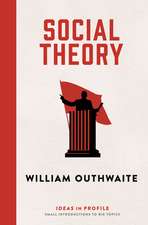Standards-Based and Responsive Evaluation
Editat de Robert E. Stakeen Limba Engleză Paperback – 10 dec 2003
| Toate formatele și edițiile | Preț | Express |
|---|---|---|
| Paperback (1) | 539.55 lei 22-36 zile | +27.96 lei 5-11 zile |
| SAGE Publications – 10 dec 2003 | 539.55 lei 22-36 zile | +27.96 lei 5-11 zile |
| Hardback (1) | 986.85 lei 43-57 zile | |
| SAGE Publications – 13 ian 2004 | 986.85 lei 43-57 zile |
Preț: 539.55 lei
Nou
Puncte Express: 809
Preț estimativ în valută:
103.24€ • 108.08$ • 85.43£
103.24€ • 108.08$ • 85.43£
Carte disponibilă
Livrare economică 17-31 martie
Livrare express 28 februarie-06 martie pentru 37.95 lei
Preluare comenzi: 021 569.72.76
Specificații
ISBN-13: 9780761926658
ISBN-10: 0761926658
Pagini: 368
Dimensiuni: 152 x 229 x 20 mm
Greutate: 0.52 kg
Ediția:New.
Editura: SAGE Publications
Colecția Sage Publications, Inc
Locul publicării:Thousand Oaks, United States
ISBN-10: 0761926658
Pagini: 368
Dimensiuni: 152 x 229 x 20 mm
Greutate: 0.52 kg
Ediția:New.
Editura: SAGE Publications
Colecția Sage Publications, Inc
Locul publicării:Thousand Oaks, United States
Recenzii
We can be grateful that Dr. Stake decided to cap his distinguished career by sharing his ideas in writing. This is a book that evaluators will want to have in their personal library. It tells us a lot about our field, highlights contrasting ways of evaluating without pitting one against the other, and manages to remind us why many of us chose this line of work in the first place.
Cuprins
First Words
1. Criterial and Interpretive Evaluation
The Ubiquitous Search For Quality
Standards
Criterial and Episodic Thinking
Roles and Styles of Evaluation
Formative and Summative Evaluation
The Evaluand
The Evaluator
2. Roles, Models, and Dispositions
Models
Dispositions
Roles
3. Standards-Based Evaluation
Standards-Based
Bias
Factors
Criteria and Standards for Comparisons
Needs Assessment
Goals
Costs
Representations of Performance
What Goes Wrong
4. Responsive Evaluation
Issues as Conceptual Structure
Observations and Judgments
Perceptions
Combining Responsive and Standards-Based Evaluation
Experience as Knowledge
Organizing and Reporting
Procedures
What Goes Wrong
5. Data Gathering
Choosing Data Sources
Instrumentation
Recipient Responses
Staff and Management Responses
Stakeholder and Public Responses
Data Coding and Records Processing
Surveys
Observation Schedules
Interviewing
Histories and Artifacts
6. Analysis, Synthesis, and Meta-evaluation
Analysis
Synthesis
Experiential and Probative Inferences
Meta-evaluation
An Ethic of Continuous Self-Challenge
7.Clients, Stakeholders, Beneficiaries and Readers
Participatory Evaluation
Stakeholding
Utilization
Democratic Evaluation
Negotiation of a Contract
Writing Reports
Styles of Reporting
Representations of the Evaluand
Names and Labels
Cutting Edge
Offering Recommendations
8. Issues Needing Interpretation
Complexity
Program Standardization
Program Fairness
Staff Development
9. Evidence-Based Evaluation
Is Evaluation Science?
Petite and Grand Generalizations
Policy Evaluation
Bias
Skepticism as a Commitment
10. Doing It Right
Quality Work Is Ethical Work
Personal Standards
Professional Standards
Human Subjects Protection
Confidentiality and Anonymity
The Business of Evaluation
Personnel Evaluation
Product Evaluation
Political and Cultural Contexts
Last Words
References
Bibliography
Index
About the Author
1. Criterial and Interpretive Evaluation
The Ubiquitous Search For Quality
Standards
Criterial and Episodic Thinking
Roles and Styles of Evaluation
Formative and Summative Evaluation
The Evaluand
The Evaluator
2. Roles, Models, and Dispositions
Models
Dispositions
Roles
3. Standards-Based Evaluation
Standards-Based
Bias
Factors
Criteria and Standards for Comparisons
Needs Assessment
Goals
Costs
Representations of Performance
What Goes Wrong
4. Responsive Evaluation
Issues as Conceptual Structure
Observations and Judgments
Perceptions
Combining Responsive and Standards-Based Evaluation
Experience as Knowledge
Organizing and Reporting
Procedures
What Goes Wrong
5. Data Gathering
Choosing Data Sources
Instrumentation
Recipient Responses
Staff and Management Responses
Stakeholder and Public Responses
Data Coding and Records Processing
Surveys
Observation Schedules
Interviewing
Histories and Artifacts
6. Analysis, Synthesis, and Meta-evaluation
Analysis
Synthesis
Experiential and Probative Inferences
Meta-evaluation
An Ethic of Continuous Self-Challenge
7.Clients, Stakeholders, Beneficiaries and Readers
Participatory Evaluation
Stakeholding
Utilization
Democratic Evaluation
Negotiation of a Contract
Writing Reports
Styles of Reporting
Representations of the Evaluand
Names and Labels
Cutting Edge
Offering Recommendations
8. Issues Needing Interpretation
Complexity
Program Standardization
Program Fairness
Staff Development
9. Evidence-Based Evaluation
Is Evaluation Science?
Petite and Grand Generalizations
Policy Evaluation
Bias
Skepticism as a Commitment
10. Doing It Right
Quality Work Is Ethical Work
Personal Standards
Professional Standards
Human Subjects Protection
Confidentiality and Anonymity
The Business of Evaluation
Personnel Evaluation
Product Evaluation
Political and Cultural Contexts
Last Words
References
Bibliography
Index
About the Author
Descriere
The book begins with the main strategic choices an evaluator needs to make between approaches: quantitatively,by explicating criteria, needs, standards, and performances, or qualitatively, by studying the activity, aspirations, problems, and accomplishments of the participants and critical observers. After reading the text, students will have a better appreciation of evaluation as a process that needs to be custom-fit to the situation. Throughout the book, Stake presents evaluation as a series of choices for the reader:
- To remain independent or to join with program staff or stakeholders
- To value personal experience as evidence or to shun it as biased
- To aid development formatively or to assess the existing program summatively
- To use issues, goals, gains, efficiency, or problem solving as the key conceptual structure
- To invest small or large in trying out and validating data-gathering procedures
- To support the standards and ethical codes of professional associations
- To remain independent or to join with program staff or stakeholders
- To value personal experience as evidence or to shun it as biased
- To aid development formatively or to assess the existing program summatively
- To use issues, goals, gains, efficiency, or problem solving as the key conceptual structure
- To invest small or large in trying out and validating data-gathering procedures
- To support the standards and ethical codes of professional associations










